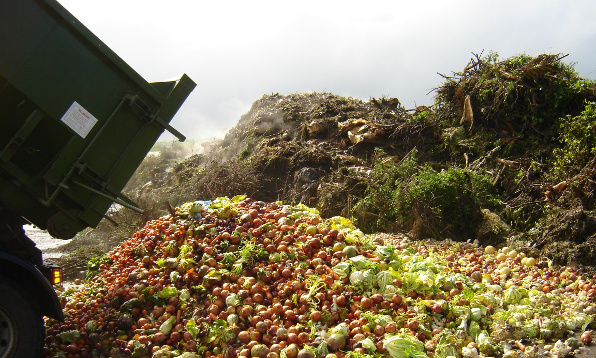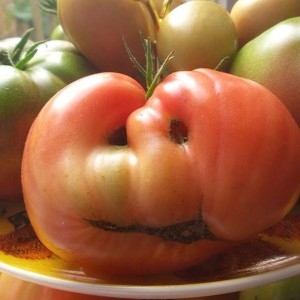This one comes from my town, and espouses principles I approve of. So, of course I’m excited to present an optimistic story amid a cavalcade of bad news. And it connects a number of principles I like to push when I have the chance…
 Dumpster diving may be a great way to beat soaring food costs and keep
Dumpster diving may be a great way to beat soaring food costs and keep
decent food on the table… But it’s probably not going to make
a huge difference in the overall food waste picture.
Embracing ‘ugly food’, understanding ‘Best Before’ dates, identifying fresh produce that’s been culled but is still good to eat, getting creative about recipes and combinations, expanding one’s horizons about the cuisines of other cultures. Those are just a few examples of the benefits coming out of an unofficial class set up by Ottawa University students that might be titled: Dumpster Diving 101: Urban Supermarket Waste Rescue.
The students live together in a shared living unit and confab most nights for supper. At least some of what they eat is usually ‘rescued’ food, stuff pulled out of supermarket dumpsters in and around their neighbourhood on weekly ‘diving’ expeditions.
What they do
The four check dumpsters they know will contain foods culled from supermarket shelves, coolers and freezers earlier that day. The secret, one kid confides, is looking only packaged, wrapped produce and other stuff that’s still reasonably free of dings, visible signs of decomposition and suspicious smells. Any food item that’s simply near or at its best before date is a candidate for redemption.
There’s usually lots to choose from, they say. And much of what is going out just because it’s reached a date threshold is on the more exotic or costly side; ingredients that might go into some fancy or exotic dish. The kids will decide what make from everything they haul home after taking a pantry census and indulging in a little brain storming.
Only after they’ve decided on a ‘meal plan’ will they go shopping conventionally, to fill in the holes in their recipes’ ingredient lists.
Why they do it
And the benefits go further than just saving money on food. Even though that was the main reason most of the participants got into dumpster diving in the first place.
“Although I can afford, for example, $6 cucumbers from Loblaws […] I just don’t think that that’s a fair price to be paying for your fruits and vegetables,” fourth-year student Elizabeth Shevchenko told CBC news. “I feel like [dumpster diving is] a quiet way of just not subscribing to that.”
But it’s worth noting that Shevchenko is part of a very small minority, in her ability to afford stuff like $6 cucumbers. That’s only possible, she admits, because she also works several full-time jobs in addition to taking a full class load.
A matter of principle
Jasmin Carter, a computer science student, became concerned about the socio-cultural aspects of the way the food supply chain currently works, after seeing the ‘enormous’ amount of food being tossed into dumpsters. Food rescue organization Second Harvest says, nearly 60 per cent of food produced in Canada is wasted annually.
Recent Ottawa U. grad and health-care worker Grace Poland says, for her, diving has become something of a hobby. She looks for foods that lend themselves to freezing so she can indulge in longer-term menu planing.
“It’s really fun,” Poland says. “It’s like Christmas morning [in] that you go and you never know what you’re going to find.”
To each, their own, as the old saying goes…
But there’s more…
The kids are also learning about foods, supporting ingredients, cooking techniques, and the eating traditions of other cultures.
As I’ve said before, that’s a good way to prepare for the coming inevitable switch to mainly-vegetarian dining being thrust upon us by climate.
There are cavets…
Rescuing meat is more problematic than rescuing produce, as meat represents a bigger challenge to manage. You have to be sure to consider for adoption only meat products that are still in sealed packages. The supermarkets actually help with that, tossing meats on their Best Before dates or, sometimes, a day or so before, just to sure nothing stays on the shelves too long. I draw a line at breached packages, or meat products that may have warmed up above the 40 F threshold and entered the FAT TOM danger zone.
And it’s becoming common practice for supermarkets to slap big orange ‘Deep Discount’ or ‘Enjoy Tonight’ stickers on ‘better’ meat products their staff experts consider still okay to eat. I’ve even bought ‘Enjoy Tonight’ meats that I’ve taken home and frozen (for up to two months). But I always make sure to remove them from the deep freeze no sooner than the day down the road on which I intend to use them. Haven’t had a single problem.
Handling and prep of rescued foods
It’s even more important than usual to thoroughly wash all produce you rescue. The dumpster environment is superbly suited to promoting cross contamination between ‘resident’ foods. In spite of the tact that a lot of natural goodness is hiding on or just under the skins of many common foods, it’s probably a good idea to peel root veggies after washing them, too, just in case.
Something else to consider…
The Ottawa U. kids who do it agree that dumpster diving is probably not for everyone. And even if the majority of consumers did do it, it wouldn’t make a huge overall difference in that 60 percent waste figure that Second Harvest reports. The majority of waste actually comes between the field and the wholesaler’s shipping dock.
So… If you do dive, do it for the right reasons. Taking advantage of any way you can to save money on food these days is valid – short of outright theft. It’s okay to feel that, and even tell others, you’re doing it for yourself, not ‘for the environment’ – if that makes you feel better about it. Even so, never forget: With the big supermarkets having just withdrawn their year-end holiday price freezes, and food prices that continue to rise in spite of falling inflation rates, an educated approach to diving could help you make ends meet on your family food budgets.
Oh, yah: Remember that, in some situations, diving could have legal implications – not the least of which might be trespassing…
~ Maggie J.

